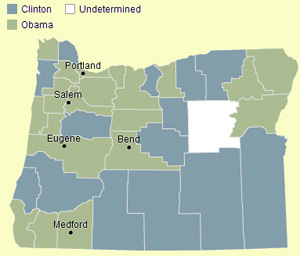| May 21 | |
|
|||||||||||||||||||||
| Democratic primaries | Republican primaries | Obama vs. McCain | Clinton vs. McCain |
News from the Votemaster
Hillary Clinton won a massive victory in Kentucky yesterday, 66% to 30%, sweeping every county except Jefferson (Louisville) and Fayette (Lexington). No exit poll data have been reported, but it is likely that the demographic breakdown was the same as everywhere else in Appalachia, with Clinton winning strongly among low-income, low-education people, women, and older voters and Obama winning the young, the black, and college educated, and the upper income. Only Kentucky has a lot more of the former than the latter.
Oregon is the reverse, with many upscale voters and creative types around Portland. The Oregon results are not as complete as those for Kentucky, but early returns indicate Obama won 58% to 42%. Here are the county-by-county maps from the NY Times.

|

|
Here are the early estimates of the delegate totals. These will certainly change during the day as the Oregon results become finalized. Also, today may be the day that some supers make their decisions known. After all, there aren't a lot of primaries left, just Puerto Rico (June 1) plus South Dakota and Montana (June 3).
| Source | Clinton | Obama | Obama-Clinton |
| NY Times | 1753 | 1930 | +177 |
| AP | 1776 | 1956 | +180 |
| CNN | 1770 | 1953 | +183 |
| ABC | 1766 | 1956 | +190 |
| CBS | 1770 | 1953 | +183 |
| MSNBC | 1783 | 1954 | +171 |
It takes 2026 delegates to win the nomination, and Obama is only about 70 short now, with about 319 still up for grabs. Obama has already won a majority of the 3253 pledged delegates. The Clinton camp is still insisting that the Michigan and Florida results be counted, which would raise the number of delegates needed to win to 2210. The DNC rules and bylaws committee meets May 31 to decide what to do. It is exceedingly unlikely they will validate elections the DNC has already voided if that would change the nomination. Once the contest is over, the DNC will probably make Michigan and Florida eat humble pie and then find some way to seat them (such as splitting the delegations 50-50).
The Republicans had primaries, too, yesterday. In Kentucky, John McCain got 72% of the vote, with Mike Huckabee, Ron Paul, and Mitt Romney getting 8%, 7%, and 5%, respectively. In Oregon, McCain did better, getting 85% to Ron Paul's 15%. The Huckabee vote might be voters trying to suggest to McCain that he pick Huckabee as Veep. The Ron Paul people really don't like McCain and are trying to show it. They don't want Paul for Veep.
Obama announced that he raised $32 million in April and has almost 3 million donors. 93% of his donations were $100 or less. This represents a revolution in politics, where $1000 plate rubber-chicken dinners used to dominate. Clinton raised $22 million in April, but her supporters are also starting to warm to the idea of Obama as their nominee. A new Gallup poll show 55% of Democrats want Obama vs. 39% who want Clinton, a gap of 16%. Two weeks ago the gap was 4%.
While most people are focusing on the presidential race, there were also two Senate primaries yesterday. In Oregon, speaker of the state House, Jeff Merkley (D) defeated activist Steve Novick 46% to 41%, with minor candidates getting the other votes. Merkley, clearly the establishment candidate, will now take on incumbent Sen. Gordon Smith (R). Smith will be one of DSCC chairman Chuck Schumer's top targets this year. Oregon is a blue state and Merkley's theme will be "Smith's a nice guy, but do you want Mitch McConnell to be majority leader?"
Speaking of Mitch McConnell, he is up for reelection this year and Kentucky Democrats decided yesterday to put up wealthy businessman Bruce Lunsford as his opponent for the Senate. McConnell is the odds-on favorite. It's very hard to buy a Senate seat, no matter how much money you have.
Ted Kennedy has a malignant brain tumor. The prognosis is grim. The medical implications have been discussed elsewhere. What are the political implications? First, you don't need a functioning brain to be a member of Congress. There are numerous examples. Second, senators can remain senators even if they are gravely ill and unable to vote. Sen. Tim Johnson (D-SD) suffered a stroke in Dec. 2006 and didn't vote for months, but is now back and running for reelection this year and expected to win. But a malignant brain tumor is much worse than a stroke. Johnson may well recover completely. For Kennedy, that will be a lot harder. If he resigns or dies, there will be a special election. It used to be that the governor appointed the new senator, as happened in Missisippi when Trent Lott resigned, but in 2004, when John Kerry was running for President and Mitt Romney was governor, the state legislature changed the law to require a special election to keep Romney from appointing a Republican to Kerry's seat should he win.
Kennedy might be a role model for Hillary Clinton. He felt he had a duty to follow in the footsteps of his slain brothers and try to become President to fulfill their agendas. He didn't make it and then went on to become a towering figure in the Senate. He can be partisan at times, but he also can work across the aisle, such as the McCain-Kennedy immigration bill. She could go that route, too, although she has other options as well, such as running for governor of New York in 2010. The possibility of her being Obama's first supreme court nominee has also been raised.
General election polls from SurveyUSA put Obama-McCain tied at 44% to 44% in New Mexico and Obama-McCain at 48% to 40% in Pennsylvania. Rasmussen puts McCain ahead 45% to 44% in Ohio.
-- The Votemaster